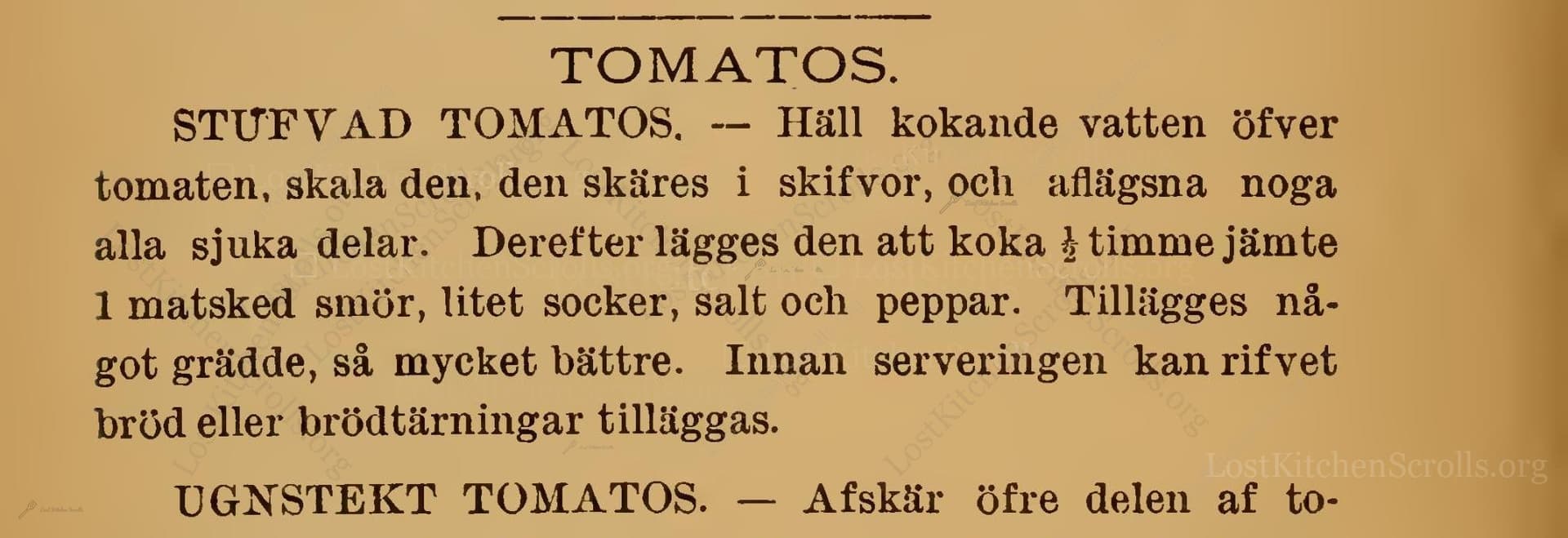
Stufvad Tomatos
"— Häll kokande vatten öfver tomaten, skala den, den skäres i skifvor, och aflägsna noga alla sjuka delar. Derefter lägges den att koka ½ timme jämte 1 matsked smör, litet socker, salt och peppar. Tillägges något grädde, så mycket bättre. Innan serveringen kan rifvet bröd eller brödtärningar tilläggas."
English Translation
"— Pour boiling water over the tomatoes, peel them, cut them into slices, and carefully remove any bad parts. Then let them cook for half an hour together with 1 tablespoon of butter, a little sugar, salt, and pepper. If some cream is added, all the better. Before serving, grated bread or bread cubes can be added."
Note on the Original Text
The recipe is written in a purposefully sparse and practical style, typical of 19th-century cookery books intended for home cooks. Quantities are often approximate, and instructions are direct, assuming a certain level of kitchen experience. The old Swedish spelling—such as 'skäres' for 'cut' and 'smör' for 'butter'—reflects the era and audience. Recipes prioritized thrift, using available ingredients and adapting to the American context, while still echoing familiar flavors from home.

Title
Praktisk, illustrerad kok-bok för Svenskarne i Amerika (1889)
You can also click the book image above to peruse the original tome
Writer
C. A. (Charles A.) Vallentin
Era
1889
Publisher
Svenska bok-och musikhandelns förlag
Background
A practical and charmingly illustrated Swedish cookbook tailored for immigrants in America, this 1889 volume serves up a delightful array of recipes and culinary wisdom, blending Old World tradition with New World ingredients.
Kindly made available by
Library of Congress
This recipe hails from the 'Praktisk, illustrerad kok-bok för Svenskarne i Amerika', published in 1889 in Minneapolis. Swedish immigrants in America brought their culinary heritage with them, weaving it into the new ingredients and foodways they encountered. This dish, with its simple and homey preparation, reflects the frugal yet flavorful ethos of 19th-century Swedish-American households, where tomatoes—once unfamiliar but increasingly popular—became cherished kitchen staples.

In the 1880s kitchen, tomatoes would be scalded in a large kettle or pot to remove their skins, then stewed in a heavy saucepan over a wood or coal stove. A sturdy kitchen knife, ladle, and simple wooden spoon were standard. Small stoneware bowls or enamelware pans might hold the breadcrumbs or cream. Cooking was done over the stovetop flame, with all steps managed by hand and eye rather than exact timers or modern gadgets.
Prep Time
10 mins
Cook Time
30 mins
Servings
2
We've done our best to adapt this historical recipe for modern kitchens, but some details may still need refinement. We warmly welcome feedback from fellow cooks and culinary historians — your insights support the entire community!
Ingredients
- 1 lb ripe tomatoes
- 0.5 oz (1 tablespoon) unsalted butter
- 0.2 oz (1 teaspoon) sugar
- Salt, to taste
- Black pepper, to taste
- 1/4 cup heavy cream (optional)
- 0.9 oz fresh breadcrumbs or bread cubes (optional)
Instructions
- Begin by pouring boiling water over ripe tomatoes to loosen their skins, then peal them carefully.
- Slice the peeled tomatoes and remove any blemished parts.
- Place the tomato slices in a saucepan and simmer them gently for about 30 minutes with 1 tablespoon (~0.5 oz) of butter, a pinch of sugar, salt, and black pepper to taste.
- For a richer flavor, add a small amount (about 1/4 cup) of cream if you wish.
- Just before serving, you may stir in some fresh breadcrumbs or small bread cubes for added texture.
- Serve warm, perhaps as a side dish or part of a simple super.
Estimated Calories
120 per serving
Cooking Estimates
It takes about 10 minutes to prepare the tomatoes and ingredients, and around 30 minutes to cook everything. Each serving has about 120 calories, and this recipe makes 2 servings.
As noted above, we have made our best effort to translate and adapt this historical recipe for modern kitchens, taking into account ingredients nowadays, cooking techniques, measurements, and so on. However, historical recipes often contain assumptions that require interpretation.
We'd love for anyone to help improve these adaptations. Community contributions are highly welcome. If you have suggestions, corrections, or cooking tips based on your experience with this recipe, please share them below.
Join the Discussion
Rate This Recipe
Dietary Preference
Main Ingredients
Occasions

Den Bockfisch In Einer Fleisch Suppen Zu Kochen
This recipe hails from a German manuscript cookbook compiled in 1696, a time whe...

Die Grieß Nudlen Zumachen
This recipe comes from a rather mysterious manuscript cookbook, penned anonymous...

Ein Boudain
This recipe comes from an anonymous German-language manuscript cookbook from 169...

Ein Gesaltzen Citroni
This recipe, dating from 1696, comes from an extensive anonymous German cookbook...
Browse our complete collection of time-honored recipes



